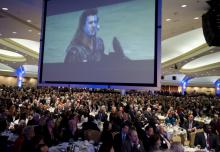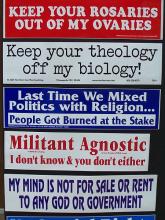Faith

Why I Hate Religion, But Love Jesus is a true Internet phenomenon, garnering more than 18 million views and sparking a global debate.
As with most internet phenomena, the viral video has given birth to dozens of similar videos from folks around the world, each adding a different (sometimes serious, sometimes not) perspective to the debates.
Whilst none has had quite the same impact as the original in terms of millions of hits, clicks and media coverage, there are conversation starters aplenty in many of these intriguing (and entertaining) videos.
See a roundup of some of the most interesting responses inside the blog...

Chevy's Mayan Apocalypse Superbowl ad. Madonna's "Like a Prayer." Romney's elusive religiosity. Eddie Long apologizes to the ADL. Mormonism on our mind. An Illinois priest let go for excessive ad libbing. Bill Maher "unbaptizes" dead people. And more...

The “E Word” in Christianity is a funny thing.
In one respect, Evangelicals are self-identified, and therefore, self-defined. On the other, popular culture (particularly media) lays its own meaning on what it means to be Evangelical. In the latter context, the word inevitably translates to “Conservative Christian.”
But I think this definition isn’t fair. What’s more, it’s not accurate.
I’m a self-proclaimed “word nerd,” so I tend to turn to etymology for help. The root meaning of “evangelical,” at least as a paraphrase, means “to tell the good news.”
Sufficiently vague, right? Depends on who you ask.

An Open Invitation to Unfriend Me on Facebook, Stop Following Me on Twitter and Discontinue Reading My Blog if You Need To:
If you are a Christian who takes offense at swear words or believes for some reason that clergy should never be cranky or irritated, then I am not the person for you to follow. It’s ok. You don’t actually need me. The entire publishing arm of the Christian Industrial Complex (I believe my friend Shane Claiborne coined that term) has a great deal of material that is just for you!

It’s been several years since I’ve attended a National Prayer Breakfast, the annual event held Thursday morning in Washington, D.C., attended by the President, members of Congress, and guests — about 2,500 of them.
When I lived and worked in D.C. I attended almost every year. Senator Mark Hatfield, for whom I worked, was a faithful member of the Senate Prayer breakfast group which met weekly, and with the group in the House, sponsors the this national event.
My worry always has been that such a gathering merely sprinkles holy water on the nation’s powerful leaders without any real accountability to the prophetic message of the Gospel. As a breakfast speaker one year, Hatfield called for national repentance for arrogance and sin, referring especially to the Vietnam War. His comments broke with the normal rhetorical decorum of the event and angered President Nixon, but received widespread coverage and much respect.
These days, the early-morning prayer breakfast is also accompanied by countless luncheons, dinners, and seminars for people who come from around the nation and the world to attend. The idea behind the prayer breakfast movement is simple: Gather politicians and leaders together in a country (or state, or city) to pray with one another “in the Spirit of Jesus,” and hope that this dependence on God will transcend differences to build a movement grounded in love for one another and one’s neighbor. It’s supposed to be devoid of “politics.”
President Obama connected his faith with his policies toward the poor at the National Prayer Breakfast on Thursday (2/2/12), a subtle but sharp contrast to remarks made by presidential hopeful Mitt Romney the day before.
"Living by the principle that we are our brother's keeper. Caring for the poor and those in need," Obama said before an audience of about 3,000 at the Washington Hilton. These values, he said, "they're the ones that have defined my own faith journey."
Specifically, Obama said, they translate to policies that support research to fight disease and support foreign aid. His faith, he continued, inspires him "to give up some of the tax breaks that I enjoy."

We're not sure whether they were inspired by Sojourners’ ongoing "What Is An Evangelical" series, but TIME Magazine has published an interesting set of short articles from influential conservatives who answer three separate, but connected questions.
Find out what they are — and offer your answers — inside the blog...

During her brief career as star of stage and screen in the late 1950s and early 1960s, Dolores Hart won a Theater World Award, was nominated for a Tony Award and gave Elvis Presley his first on-screen kiss (in the 1957 film Loving You) when she was just 19 years old.
Now 73-year-old Hart — better known for most of the last 40 years as Mother Dolores, Prioress of the Benedictine Abbey of Regina Laudis in Bethlehem, Conn. — has a new claim to fame: Oscar nominee.
Last week, God is the Bigger Elvis, a short documentary film about her journey from Hollywood starlet to cloistered Catholic nun, received an Academy Award nomination for best short documentary film.
Krumbine posited a question, a quandary about how we go on "when the honeymoon is over." How do we sustain love? What do we treasure and how do we sustain the affection and even the excitement? This morning's First Thoughts is about Gratitude. As usual, your video responses and comments are needed to flesh this thing out. I'm only starting a conversation.
Watch Tripp hash it out inside the blog ...

When our parents teach us at a very young age to say the magic words — please and thank you — they give us our first lessons in morality. Manners are the first step to morality. Etiquette is the first gesture of ethics. Manner and morals derive from the mores of a society. Etiquette derives from the ethos and ethics of a society.
When Arizona Governor Jan Brewer wagged her finger in President Obama’s face upon his arrival in her state, she demonstrated not only a disregard for the Office of the President, but she simply displayed bad manners.
In the United States, we do not have a monarch that embodies the state in his or her person. In the United States, that person is the president of the United States. He and the vice president are the only two elected officials who are elected nationwide. Thus, the president is not only the head of the executive branch of government, but he is the representative of the entire country.
Governor Brewer’s demeanor toward the president was inappropriate. However, the deeper question is why would this woman think it is appropriate to put her finger in anyone’s face, president or not?

What does it mean to be a Christian when organizations such as The Family create a Jesus that does not hear the prayers of the poor? An organization that prays to the powerful in place of God? That participates in the global crucifixion of the poor by turning Jesus' cross into a social ladder for politicians to climb upwards, past the broken body of Christ? To cultivate relationships with dictators?
To cultivate the most powerful for political influence, to create an elite society for the elite, is that listening to the prayers of the people?
I ask you, was Jesus a political networker? Did he hobnob with the most powerful? Did he cultivate relationships with the dictators of his time, Herod and Pilate?
Our political class does not hear the prayers of the poor, they hear the "prayers" of corporate lobbyists who fund their campaigns. And they hear the prayers of Christians such as Doug Coe and The Family at the National Prayer Breakfast, because they offer connections, votes, and money.
“You may not agree with religion, but at the end of the day, religions are so subtle, so complicated, so intelligent in many ways that they're not fit to be abandoned to the religious alone; they're for all of us.” — Alain de Botton in his "Atheism 2.0" TED Talk
Watch de Botton's "Atheism 2.0" talk inside the blog ...

As someone who self-identifies as an evangelical Christian, often I begin to feel like the subject of a Discovery Channel documentary, particularly in the midst of a heated presidential election cycle.
It’s Evangelical Week here on Discovery! Travel with us as our explorers track the elusive evangelical in its native habitats. Watch as evangelicals worship, work and play, all captured on film with the latest high definition technology. And follow our intrepid documentary team members as they bravely venture into the most dangerous of exotic evangelical locations — the voting booth!
I understand the interest in us evangelicals, I really do. The way much of the mainstream media covers our communities in the news can make us seem like a puzzling subspecies of the American population, not unlike the Rocky Mountain long-haired yeti.
Are we really that difficult to comprehend?
In a word, yes.

When I talk about myself in relationship to atheists I often sound like a post-civil-rights white person trying to minimize the gap between myself and another group.
I don’t have anything personally against atheists.
Some of my best friends are atheists.
I even like Ricky Gervais. He’s an atheist, you know.
All of this aside, I have tried in vain over the years to understand atheism. I’ve written about it several times, and whenever I do, I get a bucket of responses from atheists.

When I was a kid my summer job was to sell Kool-Aid to people at my mom’s rummage sales, which she and her girlfriends held several times each summer.
I remember overhearing one of mom’s customers complaining, saying something about being able to “Jew down” at our neighbor’s yard sale. I wasn’t sure why but I knew at age six that this kind of talk was very wrong and it was very offensive. Yet I would have thought nothing about hearing someone say that they got “gypped” at a rummage sale, car dealership, or a candy store. In fact it was not for another twelve years before I learned that Gypsies were a race of people with over 1,000,000 people in the US, and 10,000,000 in Europe, making them Europe’s largest ethnic minority.

Many cinephiles have a short list of virtuoso actors who are so graceful and true we'd watch them read a phone book. For me, the list includes Jeff Bridges, Helen Mirren, Diane Keaton, John Mahoney, Christopher Plummer and that great icon of American cinema, Oscar-winner Robert Duvall.
So when a publicist for Seven Days in Utopia contacted me recently about the Christian-themed film and asked whether I'd like to interview Duvall, I jumped at the chance. A loudhailer of a film, long on message and cliché but woefully short on subtlety or artistry (save for Duvall's charmingly folksy performance), Seven Days in Utopia — set in rural Texas, it's an exploration of redemption and golf — is not a flick I'm going to be urging you to run out and see or rent, unless you, like me, would watch Duvall read the proverbial White Pages.
In the film, which opened in theaters last fall and was released on DVD at the end of last year, Duval plays Johnny Crawford, a golf-pro-cum-cowboy who helps a young pro golfer, Luke Chisolm (Lucas Black), reclaim his game and his faith. Duvall's Johnny is like Yoda with a five iron and hearkens back to many of the archetypal characters the Oscar-winner (who turned 81 years old last week) has played throughout his storied career.
Duvall, who began his career on the New York stage in the early 1960s (as a struggling young actor at The Neighborhood Playhouse School of the Theatre, he roomed with fellow students Dustin Hoffman and Gene Hackman), has appeared in some of the most spiritually eloquent films of our time, often playing the role of ersatz sage and spiritual counselor. He is a workingman's working actor with about 150 performances in film and television productions under his belt buckle since his premiere in an episode of the Armstrong Circle Theater television series in 1959.
From "Boo Radley" in 1962's To Kill a Mockingbird and "Tom Hagen" in The Godfather (parts 1 and 2) or "Lieutenant Kilgore" in Apocalypse Now and "Bull Meechum" in The Great Santini, to "Mac Sledge" in Tender Mercies (for which he won the best actor Academy Award) and "Gus McCrae" in Lonesome Dove or "Wayne Cramer" in Crazy Heart and "Felix Bush" in Get Low, Duvall has created indelible characters who are authentic, honest and transcendent.
In 1884, Romney’s great-grandfather, Miles Parker Romney, fled to Mexico from Utah. Miles Parker Romney was a practicing polygamist and he wanted to protect his family from persecution. Mitt Romney’s father was born in Mexico, his family returned to the United States and took up residence in Michigan.
While Romney wouldn’t agree with his ancestor’s practice of polygamy, I am sure he understands his great-grandfather’s desire to do what he thought best for his family. Luckily for Miles Parker Romney, there was a country that allowed his family to settle and try and find a better life.
What is unfortunate is that candidate Romney doesn't seem to have that same kind of empathy for families today who are also in difficult positions.

The legacy of Martin Luther King, Jr., and the reality of climate change are both victims of western culture’s remarkable capacity to accommodate and neutralize that which is most critical of it.
Early in the civil rights movement, Bayard Rustin said to King, “I have a feeling that the Lord had laid his hand upon you. And that is a dangerous, dangerous thing.” Similarly, the FBI once described Martin King as the “most dangerous man in America” – and yet, as Martin Luther King Jr day rolls around again in the United States, we are often presented with a figure that seems more like a cheerleader for the status quo rather than a prophetic challenge to it. Somehow, it seems we have made this dangerous figure very safe.
For instance, in a speech at the Pentagon commemorating King’s legacy, the Defense Department’s general counsel Jeh C. Johnson remarked, “I believe that if Dr King were alive today, he would recognize that we live in a complicated world, and that our nation’s military should not and cannot lay down its arms and leave the American people vulnerable to terrorist attack.”
But to claim that Dr King would be pro-war today is as likely as him being pro-segregation. After all, this is the Dr King who said, “A nation that continues year after year to spend more money on military defence than on programs of social uplift is approaching spiritual death.” And this is the same Dr King who said in his speech on 4 April 1967 (a speech that turned three quarters of American public opinion against him), “To me the relationship of the ministry [of Jesus Christ] to the making of peace is so obvious that I sometimes marvel at those who ask me why I’m speaking against the war.” And this is the same Dr King who said, the night before he was murdered on 4 April 1968, “It is no longer a choice, my friends, between violence and nonviolence. It is either nonviolence or nonexistence.”
Ed Young and his wife, Lisa, have penned a new book called “Sexperiment: 7 Days to Lasting Intimacy with Your Spouse,” which is a sort of how-to guide for couples to rekindle intimacy in their marriage while remaining within the boundaries of biblical virtues, as interpreted by the authors.
First off, I’m glad evangelicals are joining the sexuality discussion. Having helped create a series of books whose first title was focused on faith and sex/sexuality, I believe it’s of great importance that faith leaders speak in open, healthy ways about sexuality, sexual expression, attraction, and so on.
One of the most hyped points made in the book is that it encourages married couples to engage in their own “Sexperiment,” where they commit to having sex each day for a week. The theory is that this will renew physical and emotional intimacy, and also help reduce the urge for things like pornography.
Hey, sex for Jesus sounds like a no-brainer to me. Sign me up!

In a recent column for USA Today, Gary Bauer (former GOP presidential candidate and President of a conservative political organization called American Values) makes a big biblical blunder. He addresses the issue of the role of faith in politics and uses Jim Wallis as an example of a Christian with whom he shares religious heritage but not political conviction.
Sojourners Editor Jim Wallis and I are both evangelical Christians. But we come to radically different conclusions about government's role in addressing poverty. Wallis thinks Republican tax cuts are unbiblical, and that more government spending and taxes are the main antidote. But nowhere in the Bible are we told that government should take one man's money by force of law and give it to another man. Jesus' admonition was a personal command to share, not a command for Caesar to "spread the wealth around."
First, Bauer mischaracterizes Wallis’ position. Sojourners and the entire Circle of Protection have called for a balanced approach to deficit reduction. This means that taxes should be on the table. But, the Circle acknowledges that there does need to be spending reductions and explicitly states that some of those reductions will need to come from entitlements.
Now, on to the biblical problem.